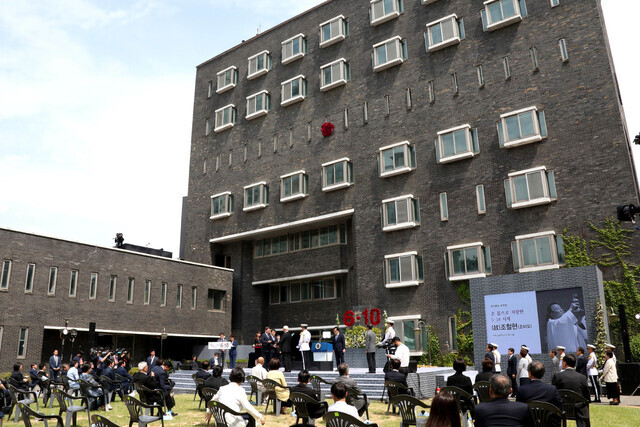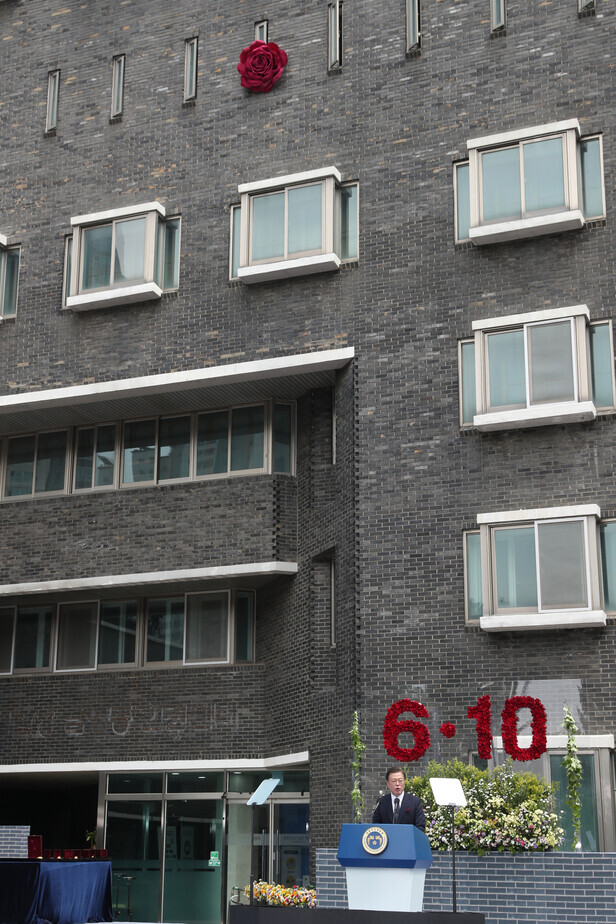hankyoreh
Links to other country sites 다른 나라 사이트 링크
[Editorial] On the June Democracy Movement’s anniversary, we need to look beyond democratization and dive into socioeconomic inequality

On June 10, the 33rd anniversary of the June Democracy Movement of 1987, a grand commemorative service was held at the building that’s slated to become the Democracy and Human Rights Memorial Hall, in Seoul’s Yongsan District. The June Democracy Movement brought together Koreans under the slogan of “down with the dictatorship,” laying a firm foundation for South Korea’s democratization. Implementing direct presidential elections established the framework for the peaceful transfer of power.
The Korean people had been disheartened by the military junta’s seizure of power through a coup d’état on Dec. 12, 1979 and by its massacre of civilian protesters in Gwangju in May 1980, but this taste of victory created momentum for the implementation of democratic principles in all areas, including politics, the economy, and society. Those of us who are alive today ought to reflect upon the significance of that movement and to renew our resolution to bring about a better future that transcends democratization and tackles socioeconomic inequality.
During the service on Wednesday, the Order of Civil Merit, Peony Medal (Moran Medal), was bestowed upon 12 individuals for their contributions to the advancement of democracy, including the late Lee So-seon, mother of labor activist Jeon Tae-il, and the late Seong Yu-bo, who fought for democratization of the media as the former head of the Hankyoreh’s editorial board. A few individual awards had been given to democracy activists during the administrations of Kim Dae-jung and Roh Moo-hyun, but this latest batch of awards carries particular meaning. After the government confirmed its plan to award figures who’d contributed to democratization, the Ministry of the Interior and Safety (MOIS) vetted people recommended by the public on its website and then handed out a large number of decorations and citations. Considering that the Japanese collaborators and the military junta had lavished decorations and citations upon themselves, leading to an unending debate about whether those decorations should be rescinded, the government should be praised for giving awards to democracy activists in a manner that’s both public and transparent. We hope this approach will be expanded upon.

The site of the commemorative service was itself significant — the police’s former anti-communist interrogation center, where countless democracy activists were illegally carted off to be tortured. That’s where Kim Geun-tae, chair of the Democratization Movement Youth League, was brutally tortured by torture specialist Lee Geun-an in 1985; it’s also where Park Jong-cheol, a university student and democracy activist, died while being subjected to water torture in Room No. 509 in 1987. We hope that this building, which will soon house the Democracy and Human Rights Memorial Hall, will become a place where we remember the blood, sweat, and tears of those who sacrificed themselves for democracy, a place that will pass on those memories to future generations.
Min Gap-ryong, commissioner general of South Korea’s National Police Agency (NPA), attended the ceremony, the first time an active police officer has done so. Afterward, the NPA announced a code of conduct to ensure that police officers respect human rights. The 10-point code reminds officers that sovereignty lies with the citizens, that cruelty is forbidden, and that they are authorized to reject orders that would violate human rights. “We feel remorse for what the police used to be,” Min said. The police need to strictly abide by this code in order to ensure they never again oppress the people in the name of law and order.
“We need to ask ourselves whether all citizens enjoy democracy in their lives. The democracy we ought to achieve is not merely institutional democracy, but a sustainable and more equitable economy,” South Korean President Moon Jae-in said during the service on Wednesday. The president’s diagnosis is correct. The June Democracy Movement is ongoing. Over the past 33 years, there has been substantial progress in procedural democracy, including establishing the tradition of handing over power and devolving wide-ranging powers to local governmental bodies. But economic and social inequality, including the gap between the rich and poor and discrimination against irregular workers, is only getting worse. Both the ruling and opposition parties have chanted slogans about resolving inequality but have little to show for it. We hope the parties will work even harder to achieve a more equitable economy, which is the task of our era, on the 33rd anniversary of the June Democracy Movement.
Please direct comments or questions to [english@hani.co.kr]

Editorial・opinion
![[Column] Season 2 of special prosecutor probe may be coming to Korea soon [Column] Season 2 of special prosecutor probe may be coming to Korea soon](https://flexible.img.hani.co.kr/flexible/normal/500/300/imgdb/original/2024/0426/3317141030699447.jpg) [Column] Season 2 of special prosecutor probe may be coming to Korea soon
[Column] Season 2 of special prosecutor probe may be coming to Korea soon![[Column] Park Geun-hye déjà vu in Yoon Suk-yeol [Column] Park Geun-hye déjà vu in Yoon Suk-yeol](https://flexible.img.hani.co.kr/flexible/normal/500/300/imgdb/original/2024/0424/651713945113788.jpg) [Column] Park Geun-hye déjà vu in Yoon Suk-yeol
[Column] Park Geun-hye déjà vu in Yoon Suk-yeol- [Editorial] New weight of N. Korea’s nuclear threats makes dialogue all the more urgent
- [Guest essay] The real reason Korea’s new right wants to dub Rhee a founding father
- [Column] ‘Choson’: Is it time we start referring to N. Korea in its own terms?
- [Editorial] Japan’s rewriting of history with Korea has gone too far
- [Column] The president’s questionable capacity for dialogue
- [Column] Are chaebol firms just pizza pies for families to divvy up as they please?
- [Column] Has Korea, too, crossed the Rubicon on China?
- [Correspondent’s column] In Japan’s alliance with US, echoes of its past alliances with UK
Most viewed articles
- 1[Column] Season 2 of special prosecutor probe may be coming to Korea soon
- 2‘We must say no’: Seoul defense chief on Korean, USFK involvement in hypothetical Taiwan crisis
- 3Is N. Korea threatening to test nukes in response to possible new US-led sanctions body?
- 4No good, very bad game for Korea puts it out of Olympics for first time since 1988
- 5Is Japan about to snatch control of Line messenger from Korea’s Naver?
- 6Division commander ordered troops to enter raging flood waters before Marine died, survivor says
- 7Korea’s 1.3% growth in Q1 signals ‘textbook’ return to growth, says government
- 8N. Korean delegation’s trip to Iran shows how Pyongyang is leveraging ties with Moscow
- 9[Editorial] Korea’s surprise Q1 growth requires objective assessment, not blind fanfare
- 10[Editorial] Government needs to stop impeding Sewol mourning